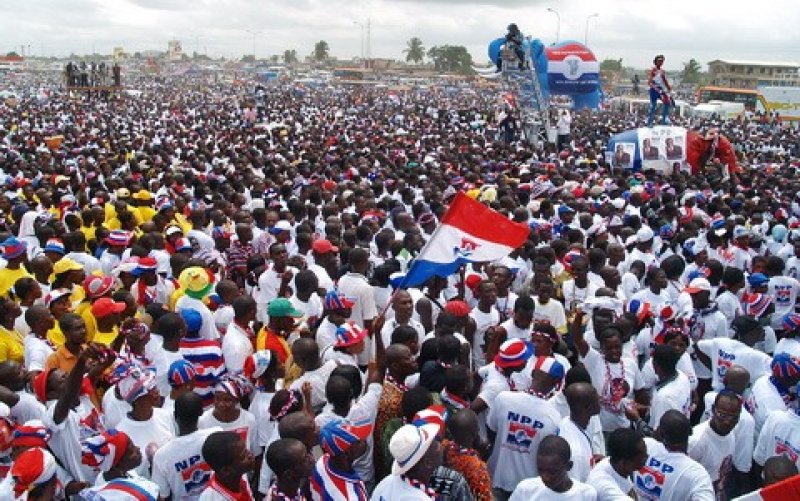The New Patriotic Party (NPP) is set to conduct parliamentary primaries in 104 constituencies on Saturday, September 28, 2019, as part of preparations for the 2020 general elections.
Termed “orphan constituencies”, these are areas where the party lost the 2016 Parliamentary Elections to the opposition National Democratic Congress (NDC) and therefore has no sitting Members of Parliament on the party’s side in Parliament. The NPP has I69 seats out of the total 275 seats in Parliament.
Saturday’s constituency delegates conference which would be taking place simultaneously in all 104 constituencies are therefore part of the steps the NPP is taking to win some of those seats in the 2020 general elections.
The party will at a later date organise parliamentary primaries in the 169 constituencies where it already has sitting MPs.
Two ‘orphans’ on hold
In all there are a total of 106 “orphan constituencies” for the NPP but for now, the primaries in two of such constituencies, Chereponi and Hohoe have been put on hold.
Chereponi is on hold because of some grievances in relation to tribal issues whilst Hohoe, where the Minister of Energy, Mr John Peter Amewu is the sole contender has also been put on hold, according to the Director of Elections and Research at the NPP, Mr Evans Nimako.
A total of 283 aspirants have since been given the green light to contest in Saturday’s Parliamentary primaries happening across the country.
Out of the 283 aspirants, it is only 28 of them that are female.
In all, a total of 292 aspirants picked forms for the contest but nine of them were disqualified during the vetting process.
16 unopposed aspirants
Out of the 104 constituencies, there are 16 of them where the aspirants would be contesting as unopposed candidates and therefore delegates would decide on their fate through popular acclamation.
The keenly contested elections will, therefore, take place in 92 constituencies.
Samuel Abu Jinapor, a Deputy Chief of Staff is contesting Damango as a sole candidate same as Mr Mustapha Ussif, the Chief Executive of the National Service Scheme (NSS) who is contesting Yagaba-Kobore as a sole candidate. Mr Ussif is a former MP for the area.
At Wassa East, Mr Wilson Atta, the District Chief Executive (DCE) for the area who is also the 2016 NPP candidate for the area is contesting as a sole candidate same as Asawasi where Alidu Seidu, the Municipal Chief Executive (MCE) who is also the 2016 NPP candidate is contesting as a sole candidate.
The Minister of Energy, Mr John Peter Amewu is also the sole candidate for Hohoe.
Nominations were opened from July 20, 2019 to August 3, 2019.
Aspirants procured nomination forms at a non-refundable fee of GH¢20,000 through a bankers draft.
In order not to leave anyone behind and to encourage more women, youth and physically challenged persons, the party pegged their fee at GH¢10,000.
‘Hot’ areas
Some of the competitive areas are Karaga where the Deputy Minister of Energy, Mohammed Amin Adam is contesting with two other candidates.
At Klottey Korle in Greater Accra, two aspirants, Henry Harold Quartey and Prince Appiah Debrah are competing for the slot.
Two female aspirants, Betty A. Korshie and Sarah Pobee are competing the Ada slot.
At Amasaman, the Municipal Chief Executive, Clement Wilkenson, Nana Oye Coffie Ago, Isaac Kwaku Mintah Sackey and Kwasi Afrifa Mensah are battling it out.
At Kpone Katamanso in Greater, David Annan, a former Tema MCE, Prince Dadzie, William Ofosu Asante, Mark Sobri and Hopeson Adorye are the aspirants.
Asuogyaman in the Eastern Region has two aspirants, Kwame Adu Darkwa and Paul Asare Ansah.
Odododiodio in Greater Accra has four aspirants, Edward Patrick Nii Lante Bannerman [2016 NPP candidate], Reginald Niibi Ayi Bonte, [former MP], Nathaniel Nartey and Michael Nii Yarboi Annan.
Amenfi West in the Western Region has five aspirants, Joseph Kwadwo Dankwa, Ignatius Akwasi Afrifa, Ernest Abekah Aidoo, Paul Denkyi [2016 candidate] and Abraham Kofi Asante of GIFEC.
At Elembelle also in the Western Region, the DCE, Kwasi Bonzo is battling the Regional NPP treasurer, Madam Anna Akaisi Horma Miezah and Isaac Minlah.
Amenfi Central has Alhaji Mohammed Abass and Patrick Hopeson Amponten.
At Juaboso, there are five aspirants, Martha Kwayi Manu (2016 NPP candidate], Danso Simon Asamoah, Francis Afenyo Kwaku, Alexander Ampaaben and Solomon Donkor.
Bia East has two aspirants, Anthony Marshall Apo and Gyedu Blay Bernard whilst Bia West also has two aspirants, Evans Amoah and Nicholas Kopon.
At Bodi constituency where the opposition NDC has been winning with big margins, the NPP is hoping to depose the sitting Member of Parliament, Sampson Ahi with either of the two aspirants Amoah Mensah Kennedy and Ignatius Akwasi Amankwa
Regional breakdown
The Ashanti Region has three of the NPP “orphan constituencies”, Asawasi, Ejura Sekyeredumasi and Sekyere Afram Plains.
Greater Accra has 13 orphan constituencies, Northern region has nine and North East has three – Chereponi, Yagaba-Kobore and Yonyoo.
The Savannah region has six, Upper East and Upper West has six each. All 18 constituencies in the Volta are orphan for the NPP whilst the Western Region has four.




















